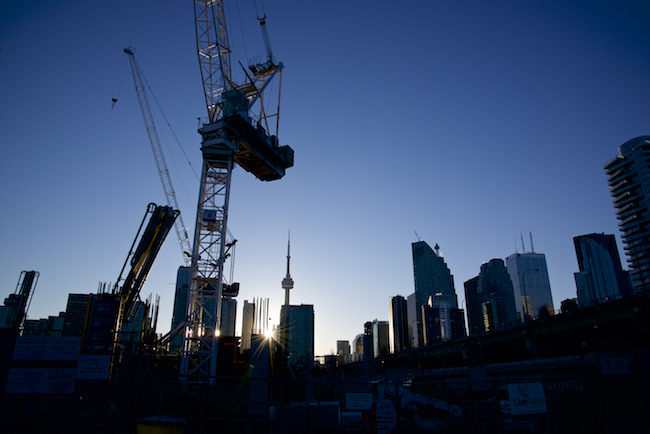
Job sites stay open across country, though pair of Quebec unions call for halt to construction
By David Kennedy
Health & Safety COVID-19A flood of ordinary workers and industry groups have committed to carrying on, others have broken ranks and called for construction to stop

Additional safety measures have been implemented on numerous job sites, including those emphasizing the importance of social distancing. PHOTO: Getty Images
Streets across Canada ordinarily packed wth traffic have gone quiet, noise emanating from restaurants and bars has ceased, but hammers continue to pound on construction sites. Widespread efforts to slow the spread of COVID-19, or coronavirus, have not stopped work on most jobs across Canada — though many are operating with reduced staff and under added precautionary measures.
While a flood of ordinary workers and industry groups have committed to carrying on, others, including two prominent Quebec labour groups that represent dozens of local unions, broke ranks this week, calling for construction to cease, at least temporarily.
In a release March 18, FTQ-Construction and Conseil provincial (International) called on Quebec Premier François Legault to suspend work until the province’s health authorities can establish a framework for protecting workers.
Éric Boisjoly, the director general of FTQ-Construction said the province’s construction workers are not “guinea pigs” and must not continue to work without the proper protection.
The groups pointed specifically to sites where washrooms aren’t available and to confined space assignments that don’t allow staff to maintain adequate separation as particularly troublesome. Since Monday, the union organizations noted, several hundred workers have refused work due to unsanitary conditions or a lack of respect for social distancing guidelines.
As in other provinces, Quebec has ordered high-traffic businesses such as bars, restaurants and theatres to close, but construction projects do not fall under the umbrella. In neighbouring Ontario, Premier Doug Ford declared a state of emergency earlier this week and other provinces have since followed suit. Provincial governments have not ordered sites shut down, though in an update March 17, the Ontario General Contractors Association noted that some have closed.
Instead of shutdowns, most contractors, industry organizations and labour groups are advocating or implementing new safety protocols designed to help guard against spreading the virus.
In a joint statement March 20, the Construction Employers Coordinating Council of Ontario (CECCO), the Council of Ontario Construction Associations (COCA), the Construction and Design Alliance of Ontario (CDAO) and the Provincial Building & Construction Trades Council of Ontario (PBCTCO) said the “ever-evolving situation” should not shut down sites.
“We are advising that construction worksites in the province of Ontario remain open and that the appropriate preventative measures be implemented and enforced on every construction worksite in the province,” the groups said, adding that the province’s Ministry of Labour, Training and Skills Development should step up enforcement to make sure enhanced safety guidelines are met.
A March 21 statement from the Canadian Construction Association echoes the stance, advocating construction and related manufacturing activities remain operational, but further precautions be taken to protect workers.
Among a host of other issues, halts to construction would have dramatic ripple effects throughout the industry’s supply chain and the closely-linked financial bond and insurance markets that support the industry. In spite of impending worker support packages from Ottawa and Canada’s provincial governments, closures would also have major repercussions for everyday workers.
“The practical reality is that many of our members wish to continue to work while it is safe for them to do so,” prominent Toronto union LiUNA Local 183, wrote in a website update March 18. “The Union will assist its members by ensuring that all reasonable precautions have been put in place for their safety.”
Typically, contractors have implemented enhanced cleaning regimens on-site, moved as many workers off projects as possible and spelled out social distancing guidelines.
“While our offices and job sites remain operational, we have restricted all non-essential travel, limited visitors to our sites and offices, encouraged employees to work from home (where possible), increased cleaning activities in our offices and project sites, and have staggered breaks to limit the number of people together at one time,” Graham Group Ltd. wrote in a recent update.
PCL Constructors Inc., EllisDon Corp. and Pomerleau Inc., to name a few, have all taken similar steps.
Some major owners are also adjusting their approach as the coronavirus crisis continues to evolve.
On March 18, for instance, BC Hydro said it would scale back work at its Site C dam in B.C. in response to the pandemic.
“Focusing only on essential work and critical milestones will help reduce the number of workers staying at the worker accommodation lodge and result in fewer workers travelling to and from Fort St. John and the Peace Region,” the crown-owned entity said in a release.
“Over the coming days, BC Hydro will work with project contractors and unions to safely scale back certain construction activities at the project site.”
LNG Canada, which is building a sprawling new terminal and export facility in Kitimat, B.C., made a similar announcement March 16, saying it will reduce its staff by about half over the next week.




